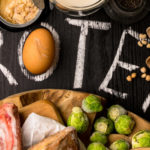
Nutrition for Athletes: What Foods to Eat and When to Eat Them
11/10/2016
The right diet can help you be at the top of your game, whether you’re a serious athlete, a member of a school team or playing for fun. The types of food, syncing with your activity level and the time of meals all have an impact. We turned to Dr. Gordon Zello, who is doing some interesting research involving nutrition for athletes, for some insight. He is a professor of nutrition in the College of Pharmacy and Nutrition at the University of Saskatchewan.
One of the most common questions about athletic activity is “Should I eat before or after playing a game?” He advises that it is very important to eat before any strenuous physical activity, but not immediately before.
Dr. Zello: Food takes time to digest, and you want the nutrients from the food to be available for energy to maximize their effect for the physical activity. For this to occur, it is recommended that one eats two to three hours before engaging in the sporting activity. This will allow for both the digestion and absorption of the nutrients and energy from the food to reach the cells of the body, such as muscle, and thus be available when one is physically active.
As you plan your pre-game meal, what are the best foods to eat?
Dr. Zello: This is a very interesting question and particularly for hockey players and other sports, such as soccer, where the games are long and intermittent and the need for sustained energy is important. Traditionally, it has been recommended to consume a high carbohydrate meal before engaging in a sporting activity, as this would maximize your glycogen stores in the muscle. Glycogen is a long chain of glucose which can be broken down for energy when exercising. The problem with just relying on glycogen as an energy source is that the stores available are often used up during the sporting event. The result is that you have tired hockey and soccer players that may not be performing at their best towards the end of the game.
Dr. Phil Chilibeck, exercise physiologist, and myself have been exploring the use of low glycemic meals prior to soccer games as a way to sustain energy supply for a longer period of time. Consuming low-glycemic meals, such as those containing pulses (e.g. lentils, chickpeas, beans) or pasta, may have an advantage over the typical high-glycemic foods such as potatoes or white bread. The low-glycemic foods release their energy more slowly and rely both on glucose and fat oxidation (breakdown) to provide energy. Our research has shown that eating pulses prior to sports that involve intermittent activity results in players performing as well or better than when consuming a high glycemic meal, and tends to better preserve muscle glycogen (carbohydrate stores) during exercise.
That raises another question. Are there food you should avoid eating before a game?
Dr. Zello: My recommendation would be not to consume foods that make you feel too full prior to the sporting event. One way to control this is limit the quantity of food you eat and ensure the meal prior to the sporting event is nutrient and energy dense. Also, avoid foods that are high in fat – they take long to digest and don’t offer the same benefits as carbohydrates for exercise performance.
Another critical aspect is drinking liquids during physical activity.
Dr. Zello: Hockey players often consume sports drinks during their games. This is effective mainly for preventing dehydration, but may also provide energy to muscles, especially late in the game or if the player has much ice time.
So eat before the game – and also afterward because your body is still expending energy because of the physical activity, he recommends.
Dr. Zello: Recovery is an important part of getting yourself in shape for your next physical activity, which in hockey, especially tournament hockey, can be a few hours later or the next day. After-exercise meals that are currently recommended include those with a good protein source and carbohydrates.
Milk has been promoted as beneficial drink to include after exercise, and we have been studying meat alternatives such as pulses as a good after-activity meal. They are low in fat, high in fiber, contain good levels of protein and carbohydrates that are slowly digested resulting in slower release of glucose into the blood stream. A slower release of glucose in the blood results in less release of insulin which is beneficial for health.”
As for hockey, are there any special considerations about playing in a cold environment?
Dr. Zello: The only thing with regards to playing in a cold or hot environment is that in both situations the body will require more energy to perform the activity, as the body uses energy to either warm up or cool down the person.
Playing a game of hockey uses a lot of calories. It’s okay to eat whatever you want then, right?
Dr. Zello: No!!!
Got it! But why not?
Dr. Zello: This is a big problem with some athletes, as it is all about calories and not the type of food you eat. Remember, that your food preferences and diet stay with you long after you stop playing the sport so it is important that one eats well and understands the benefits of eating well during their sporting career. You may be able to burn all those calories while involved in the sport, but once you stop and continue with the same diet pattern you are more susceptible to chronic diseases such as obesity, diabetes and cardiovascular disease. Many sport teams and association have recognized this, and now have dietitians on the support team to ensure that the foods eaten by the players are not only calorically dense but are healthy choices too.
Nutrition makes in a difference in how you play the game. Eating the right types of foods and coordinating with your schedule can help you get even more benefit out of exercise and athletic activity.


























